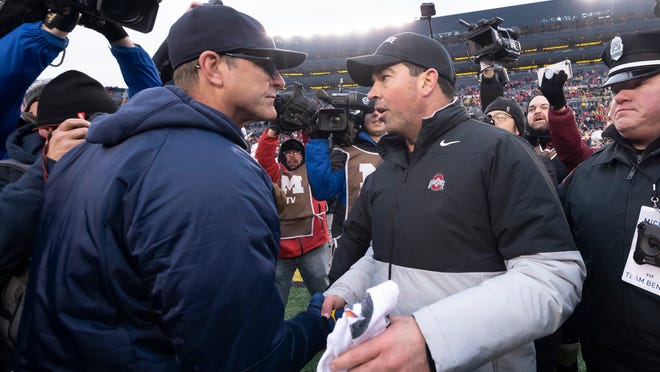Attendance at Michigan football games 'won't be normal' this year
 Angelique S. Chengelis
Angelique S. Chengelis
Michigan athletic director Warde Manuel said he is hopeful that sports will resume on campus this fall but so much is still in flux.
Manuel has been on weekly conference calls with Big Ten athletic directors and said while a final decision on the upcoming football season has not yet been reached, he believes that could come by the end of this month or early July.

Manuel said these have been trying months because of the coronavirus and also the heightened level of social unrest following the death of George Floyd that launched protests across the country of police brutality against African-Americans.
With much on his mind and plate, Manuel continues to work toward creating a safe return for Michigan student-athletes.
Michigan football players, as well as men’s and women’s basketball players, started returning to campus this week to take part in COVID-19 testing as preparation for returning to voluntary conditioning workouts. According to Dr. Sami Rifat, the head team physician at Michigan, of the 221 COVID-19 tests taken this week, two athletes tested positive.
College and professional athletics were suspended in mid-March, but there is growing momentum toward a college football season as long as the health and safety of athletes and staff can be maintained.
“We’re all working at it,” Manuel said on a conference call with reporters Thursday. “We haven’t had a final decision on the season and how it will look in every aspect of that. How many fans we’ll have in the stadium? I can tell you it won’t be normal. We won’t have 110,000 people in Michigan Stadium this year.
“Will it be 50 percent or 30 percent or 20 percent or 10 or zero? I’m not sure. That will be a combination of listening to our public health officials knowing what our stadium capacity can handle, given the direction that is put out by the governor’s office. It all depends.”
Manuel said he has had conversations with professional organizations in the state, as well, trying to determine the best approach to a return of sports.
“It is going to be a different year,” Manuel said. “We know that from a capacity standpoint in our stadium, (and) financially it will be a much different year. We’re continuing to work on budget models, refining it, reducing expenses. There are a lot of unknowns right now.”
Michigan coach Jim Harbaugh said earlier this month while appearing on ESPN’s “Get Up!” that it would be challenging to test an enormous number of fans attending a football game at Michigan Stadium. He said without a vaccine, having a full stadium wouldn’t happen.
But Harbaugh said he and the players would have no issue playing games without fans or a partially full stadium.
“Heck yeah I’d be comfortable coaching a game without any fans,” Harbaugh said. “If the choice were play in front of no fans or not play, then I would choose to play in front of no fans.”
Manuel said these have been trying months with the COVID-19 pandemic and the social unrest in response to the death of George Floyd that launched protests of police brutality across the country and world. Harbaugh and several of his players and assistants took part in recent a protest in Ann Arbor, and the Big Ten has launched an anti-racism and anti-hate coalition with staff and student representatives from each school.
“It has been a tough time for all of us as we deal with both the coronavirus and the planning that needs to take place, as well as the social unrest given what happened to George Floyd, Rashard Brooks, Breonna Taylor and others,” Manuel said. “Very difficult times for us all, difficult times for our student-athletes, and we will continue to go through it. I think you’ve seen some of the quotes that my staff has put out related to some of the issues and incidents that have occurred.
“I just want to make it clear that our student-athletes have a voice that I respect deeply, our coaches do, all of them. And in this time, many of our black student-athletes are hurting. I’m hurting as a black man, and it is something that we’re gonna continue to work toward and fix and make better in our society. And I have made sure that they understand that I want them to be proactive, take actions to move the needle, whether its registration to vote, whether it’s taking a knee if they want to do that and want to explain how they feel about it and why. And to really just continue to move us forward as a society, as a university as a community.”